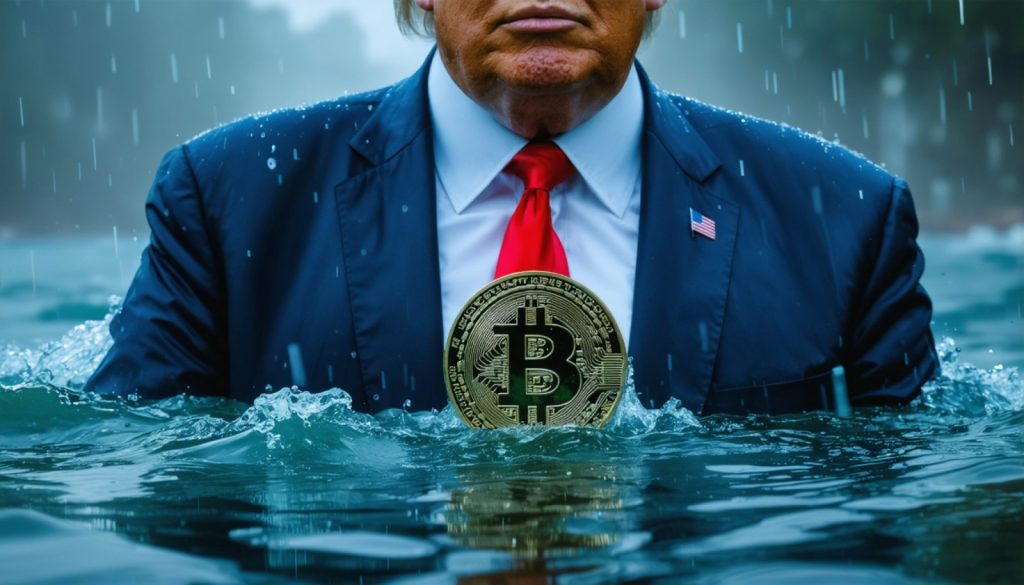
- Cryptocurrency’s landscape is increasingly influenced by politics, raising concerns about transparency and ethics.
- The FBI has highlighted a surge in crypto-related scams and thefts.
- Donald Trump’s recent return to politics has impacted crypto regulations, stirring debates on ethical boundaries.
- The promotion of $TRUMP memecoin raises concerns about conflicts of interest and political financing rules.
- Trump’s crypto dealings may affect legislative initiatives like the GENIUS Act, focused on regulating “stablecoins.”
- Political donations from major crypto firms to influence policy highlight crypto’s role in finance and regulation.
- Cryptocurrencies have potential for economic innovation but are vulnerable to misuse as political tools, risking trust and accountability.
In the ever-evolving landscape of cryptocurrency, political affiliations now intertwine with blockchain dreams, casting shadows on transparency and ethics. The aroma of digital coins still stings with the scent of scandal, a narrative reinforced by law enforcement agencies worldwide. The FBI, in a recent analysis, flagged crypto for the swelling tide of scams and thefts, cautioning that criminality in the field is rampant.
Enter Donald Trump—a name that reverberates polarizing debates, and now, a fresh chapter in the crypto saga. Trump’s ascendancy to power, especially his recent presidential return, offered an unexpected twist to crypto narratives. An executive order saw the dismantling of federal crypto regulations, proclaiming a new dawn for digital assets and financial autonomy. Yet, it seems to be a double-edged sword for the realms of corruption and intrigue.
Rumblings of perceived conflicts of interest echo across the halls of power. Critics allege Trump’s engagements—most notably through the promotion of a memecoin dubbed $TRUMP—have blurred ethical lines. While crypto enthusiasts imagined a renaissance under Trump’s leadership, the reality has unfolded into a complex tapestry of controversy. Memecoins, with their whimsical origin stories and viral appeal, are embraced with skepticism. The $TRUMP coin, offered as a token for exclusive dinner access with Trump himself, showcases the web of political influence and financial allegiance spun in the digital age. Financial contributions from foreign nationals and potential breaches of political financing rules trigger alarms, provoking bipartisan concern in Congress.
The allure of cryptocurrency has indeed tantalized political campaigns, culminating in a financial surge unlike any before. Trump’s dealings, framed against a backdrop of regulatory pushbacks and inquiries, potentially jeopardize legislative initiatives like GENIUS Act, aimed at reigning in the arthritic multiverse of “stablecoins.”
While the Trump family’s cryptocurrency ventures are variously acclaimed and vilified, their implications resonate beyond personal family fortunes. They beckon a scrutiny into the molten core of political ethics, regulation, and evolving financial technologies. Voices within the industry, such as veteran crypto investors, denounce the precarious mixing of volatile meme-trends with legitimate economic strategy.
Yet, crypto’s impact extends well beyond the White House. Political donations surged, with entities like Coinbase and Ripple Labs funneling millions to PACs during election cycles, painting politics with strokes of blockchain and bytes. Their influence didn’t just buy access; it swayed regulatory inertia—the SEC’s sudden closure of cases against major crypto firms serves as testament.
In these narratives, the takeaway emerges: while cryptocurrencies hold promise as tools for innovation and economic diversification, their exploitation as political levers taints potential and breeds distrust. As Trump’s involvement with crypto underscores a period rife with both opportunity and risk, the regulatory dance continues—pitting economic liberty against the foundational need for transparency and ethical governance.
As the digital storm swirls around the Oval Office, what remains to be seen is whether cryptocurrencies will traverse pathways of accountability or remain ensnared in their own virtual quagmire.
Inside the Political Storm: How Cryptocurrencies Are Shaping Modern Politics
The Emergence of Cryptocurrencies in Politics
In recent years, cryptocurrencies have increasingly permeated political landscapes, oscillating between innovation and controversy. The narrative is complex, intertwining blockchain technology with political agendas. A notable episode is Donald Trump’s return to the political arena with his distinct take on cryptocurrency regulations, which further complicated an already intricate landscape.
How Trump’s Presidency Impacted Crypto Regulations
Donald Trump’s unexpected removal of federal crypto regulations marked a significant pivot in the governmental approach towards digital assets. This move, viewed by some as a progression toward financial autonomy, paradoxically opened avenues for potential misuse:
– Financial Freedom vs. Ethical Concerns: The executive order removed checks, creating a fertile ground for financial misconduct. A notable example is the rise of the $TRUMP memecoin, which merged political influence with cryptocurrency, raising questions about ethical boundaries and financial contributions from foreign nationals.
– Impacts on Regulatory Efforts: Legislation like the GENIUS Act, designed to regulate stablecoins, faces increased scrutiny amidst Trump’s actions. Experts argue that his involvement might hinder necessary oversight, which could stabilize the volatile crypto market.
Why $TRUMP Memecoin Sparks Controversy
The $TRUMP token exemplifies the intersection of digital currency and political sway. Promoted with promises of exclusive access to Trump himself, it blurs lines between political fundraising and financial ventures, stirring bipartisan unease. The concerns are manifold:
– Potential Breaches of Finance Rules: Political financing laws may be breached, especially with foreign monetary contributions being flagged.
– Memecoins and Economic Strategy: While memecoins like Dogecoin have thrived on virality, using them within political frameworks invites stability concerns, as criticized by veteran crypto investors.
Crypto and Political Donations: The Wider Implication
While Trump’s actions highlight the intersection of crypto and politics, other entities like Coinbase and Ripple Labs have also influenced the political realm. Their significant political donations raised discussions on the authenticity of political insights driven by crypto interests.
The Controversy Surrounding Cryptocurrencies in Politics
The integration of cryptocurrencies in political frameworks is not devoid of controversy:
– Regulatory Challenges: The alignment (or lack thereof) between political donations, crypto influence, and government regulations raises transparency concerns.
– Exploitation as Political Tools: The potential to wield cryptocurrencies as instruments of political warfare, rather than finance, underscores the necessity for ethical governance frameworks.
Future Trends: What Lies Ahead for Crypto in Politics?
As the political and technological realms converge, several trends have emerged:
1. Enhanced Regulation: Experts predict a push for more stringent crypto regulations to safeguard against misuse.
2. Increased Adoption: Political campaigns may witness a rise in crypto donations, facilitating targeted campaign strategies using blockchain transparency.
3. Blockchain Integration in Governance: Exploring blockchain technology for electoral processes could bolster transparency and authenticity, though this too faces ethical and technical scrutiny.
Actionable Recommendations
For individuals looking to navigate the turbulent waters of cryptocurrency, here are some quick tips:
– Stay Informed: Regularly monitor legal and regulatory changes in the crypto space to make informed decisions.
– Seek Transparency: Opt for cryptocurrencies and political figures committed to transparency in operations and dealings.
– Diversify Investments: Given the volatile nature of cryptocurrencies, diversifying your portfolio can minimize risk.
– Engage with Trusted Platforms: Use reputable crypto exchanges that adhere to security standards and ethical norms.
For more insights into the evolving cryptocurrency landscape, visit Forbes or BBC.
As the digital and political worlds increasingly intertwine, questions of accountability and ethical considerations remain. What emerges will greatly shape the future of both governance and digital economies.



